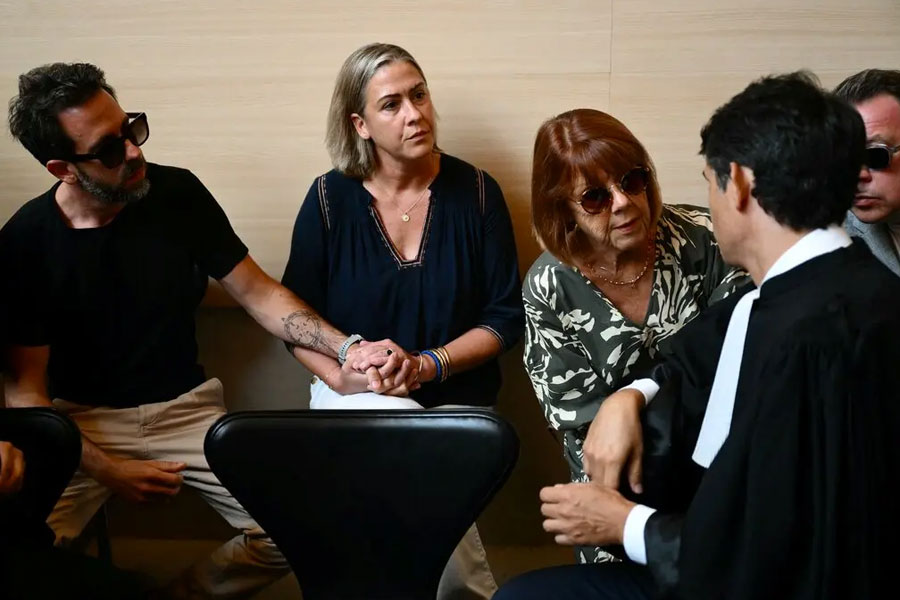Caroline Darian and her two brothers were frantically moving their mother out of the family house that had effectively become a crime scene when she was interrupted by a call from the police saying they had something to tell her in person. It could not wait.
She was already shattered by the news that the father she always believed was loving and supportive had been arrested on suspicion that he drugged and raped her mother, and that he allegedly brought other men to join him in violating her for almost 10 years.
What, she wondered that day in November 2020, could there be left to learn?
What came next was a new shock, Darian testified Friday in her father’s trial. Besides the thousands of photos and videos the police said her father kept of her unconscious mother being abused, the officers had discovered two photos of another woman asleep in bed, with the covers off and the lights on. It took Darian, who goes by a pen name she created after the accusations, a while to register that the woman was her.
“I realized right away I was drugged in that photo,” Darian, 45, testified before the criminal court in Avignon, France.
The question that still haunts her: “To do what?”
Prosecutors have not charged her father with drugging or sexually abusing her, which she suspects he did and which his lawyer said he denies. But he is accused of violating her privacy by “taking, recording or transmitting” a sexual image of her without her knowledge.
While it is clear that the undisputed victim at the center of this devastating family drama is Darian’s mother, Gisèle Pelicot, the entire family remains badly wounded and dogged by questions that perhaps will never be answered.
Some 51 men went on trial this week in Avignon, most of them accused of raping Pelicot while she was drugged. Her husband, Dominique Pelicot, has admitted to mixing sleeping pills in her food and drink for almost a decade and bringing dozens of men he met online into their bedroom to join him in raping her.
Three family members testified Friday: Darian, her sister-in-law and her former sister-in-law.
Until the revelations by the police, the family members say, they all believed that Dominque and Gisèle Pelicot, who had been together for about 50 years, had a strong, loving marriage. The couple’s three children loved them so much, they often lived with them as adults, vacationed with them and brought their children down to their home in southern France for long summer vacations.
“It was a bit the ideal family,” said Aurore, Dominque Pelicot’s former daughter-in-law, who was married to his younger son and asked that her last name not be used.
Céline Pelicot, who is married to Dominique Pelicot’s older son and has three children with him, described Dominique Pelicot as caring with the children. And although she said he had grown more ill-tempered in recent years, she had never heard even a foul word about women emerge from his mouth.
“I loved him,” she said of the elder Pelicot, who is now in jail. “I spent magnificent times with him.”
Now, she said, the family is left to wonder about what was really happening when they were together. “We are all asking our children, whom we left with their grandparents, things we normally don’t ask them — what did he do to you?” she said.
Dominique Pelicot is also charged with violating the privacy of both Aurore and Céline Pelicot on suspicion of taking sexual photos of them without their permission. Some of the photos were taken from inside bathrooms, where the women were naked. Both women testified that they felt degraded.
Céline Pelicot worried that he might have disseminated the photos and said she now rarely slept more than two or three hours a night and had been losing her hair.
Aurore told the court that she once thought she heard Dominique Pelicot say something to her nephew about the child’s apparent refusal to play doctor with him. But she didn’t tell anyone, for fear she had imagined it. She was the victim of abuse in her family, she said, which made her worry she was prone to seeing abuse everywhere.
“Obviously, I ask myself now, if I had said something,” she added, after a long pause to compose herself. “We all carry a kind of guilt about what we could have done, and this is mine.”
They have all struggled in their own ways to make sense of it all and to rebuild their lives. Darian tried to turn her family trauma into action, forming a nonprofit association, Don’t Put Me to Sleep, to publicize the dangers of drug-facilitated crimes.
She also wrote a book called “And I Stopped Calling You Papa,” detailing the emotional fallout of the day in November 2020 when the police told her mother, and then her, what they had discovered. She now often refers to him as her “genitor.”
She lives with the conviction that her father drugged her, no matter what he says, she testified. And she worries what else he did when she was in that state.
“What can you do for a person like me to heal?” she asked in court. “To have a normal life of a woman, a normal sex life.”
Calling her father the “greatest sexual predator of the last 20 years,” she asked, how do you rebuild from the ashes?
The New York Times News Service











